Golden Dawn Spread
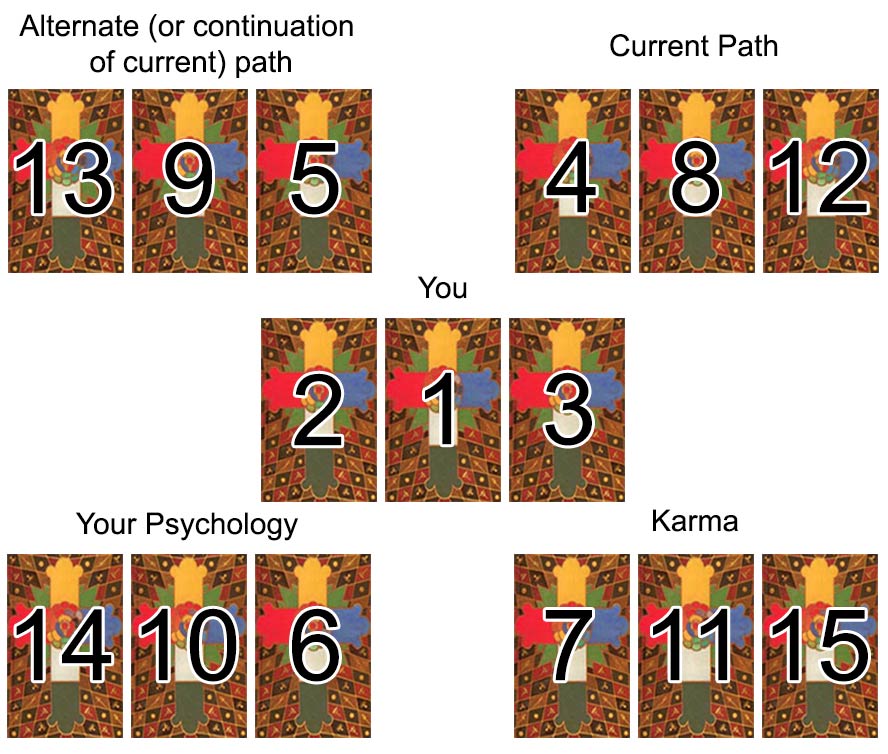
Card Positions
Your Golden Dawn Reading
| The Alternate Path (or Extension of Current Path) |
Your Current Path |
|||||
4 of Swords |
The Lovers |
Lust |
Knight of Wands |
Fortune |
The Emperor |
|
| The Querent | ||||||
The Moon |
Knight of Swords |
Prince of Wands |
||||
| The Psychological Basis | Karma | |||||
Queen of Swords |
Ace of Disks |
2 of Wands |
5 of Cups |
7 of Swords |
6 of Disks |
|
This spread is set up to read a certain way with the Court cards. Princes and Queens represent actual men and women connected with the matter, while Princesses generally represent ideas; thoughts or opinions, and Knights represent arrival or departure of a matter depending on the direction faced.
In this spread particular attention should be payed to a card's exact position in relation to its neighbors. Whether the neighbor cards bear the same energy (suit) determines whether a card is considered well- or ill-dignified. Opposite suits ill-dignify each other, while other suits are considered friendly. Cards of the same suit strengthen each other.
Also it is important to count the cards' tendencies, such as whether there is a lot of one particular suit or number pattern. Patterns reveal special messages. Lots of trumps means higher forces at work, lots of cups means strong emotions, etc.
The Querent
Cards represent the querent and the nature of the topic at hand. The first card (in the center of the spread) represents the very core of the matter, and the other 2 cards around it are added to it in order to further comprehend the nature of the topic.
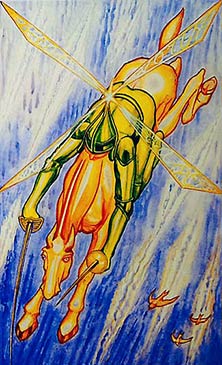
Gemini
The Knight of Swords represents the fiery part of Air; he is the wind, the storm. He represents the violent power of motion applied to an apparently manageable element. He is a warrior helmed, and for his crest he bears a revolving wing. Mounted upon a maddened steed, he drives down the Heavens, the Spirit of the Tempest. In one hand is a sword, in the other a poniard. He represents the idea of attack.
The moral qualities of a person thus indicated are activity and skill, subtlety and cleverness. He is fierce, delicate and courageous, but altogether the prey of his idea, which comes to him as an inspiration without reflection.
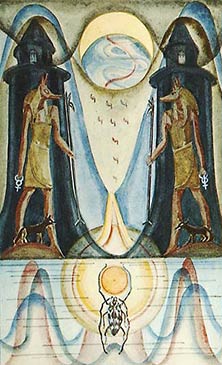
Pisces
Illusion, deception, bewilderment, hysteria, even madness, dreaminess, falsehood, error, crisis, "the darkest hour before the dawn", the brink of important change.
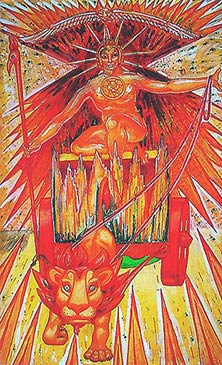
Leo
The moral qualities appropriate to this figure are swiftness and strength. But he is sometimes inclined to act on impulse; sometimes easily led by external influences; sometimes, especially in trifles, a prey to indecision. He is often violent, especially in the expression of an opinion, but he does not necessarily hold the opinion about which he is so emphatic. He states a vigorous proposition for the sake of stating it. He is in fact very slow to make up his mind thoroughly on any subject, but always sees both sides of every question. He is essentially just, but always feels that justice is not to be attained in the intellectual world. His character is intensely noble and generous.
He may be an extravagant boaster, while slyly laughing both at the object of his boast and at himself for making it.
One of his greatest faults is pride; meanness and pettiness of any kind he holds in infinite scorn. His courage is fanatically strong, and his endurance indefatigable. He is always fighting against odds, and always wins in the long - the very long-run. This is principally due to his enormous capacity for work, which he exercises for its own sake, "without lust of result".
Your Current Path
Cards represent your current path as it would unfold naturally. These cards are read in chronological order from left to right.
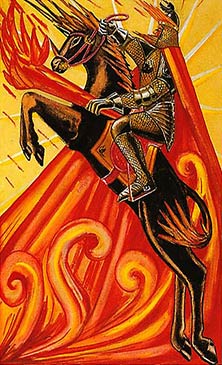
Saggitarius
The Knight of Wands represents the fiery part of Fire. He is a warrior in complete armour. On his helmet for a crest he wears a black horse. In his hand he bears a flaming torch; a flame also in his mantle; and upon the flames does he ride. His steed is a black horse leaping.
The moral qualities appropriate to this figure are activity, generosity, fierceness, impetuosity, pride, impulsiveness, swiftness in unpredictable actions. If wrongly energized, he is evil-minded, cruel, bigoted and brutal. He is in either case ill-fitted to carry on his action; he has no means of modifying it according to circumstances. If he fails in his first effort, he has no recourse.
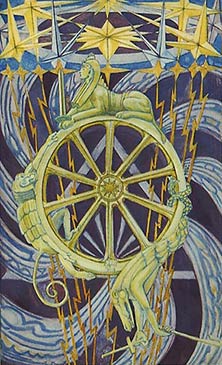
Jupiter
Change of fortune. (This generally means good fortune because the fact of consultation implies anxiety or discontent.)
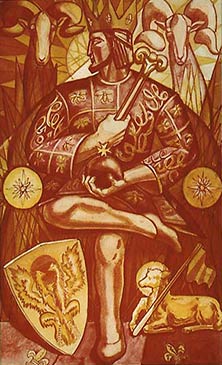
Aries
War, conquest, victory, strife, ambition, originality, over-weening confidence and megalomania, quarrelsomeness, energy, vigour, stubbornness, impracticability, rashness, ill- temper.
The Alternate Path
Cards represent the alternate path that you could choose to take in lieu of the Current Path. However, if the cards that come up seem to indicate that they go along with the Current Path, these 3 cards should be interpretted not as an Alternate Path, but as a chronological extension of the Current Path (also read from left to right).
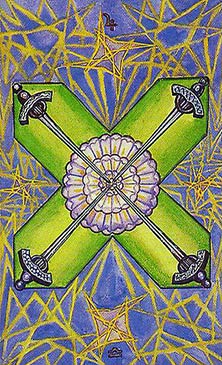
Jupiter in Libra - Truce
Chesed refers to Jupiter who rules in Libra in this decanate. The sum of these symbols is therefore without opposition; hence the card proclaims the idea of authority in the intellectual world. It is the establishment of dogma, and law concerning it. It represents a refuge from mental chaos, chosen in an arbitrary manner. It argues for convention.
The hilts of the four Swords are at the corner of a St. Andrew's cross. Their shape suggests fixation and rigidity. Their points are sheathed -- in a rather large rose of forty-nine petals representing social harmony. Here, too, is compromise.
Minds too indolent or too cowardly to think out their own problems hail joyfully this policy of appeasement. As always, the Four is the term; as in this case there is no true justification for repose, its disturbance by the Five holds no promise of advance; its static shams go pell-mell into the melting-pot; the issue is mere mess, usually signalized by foetid stench. But it has to be done!
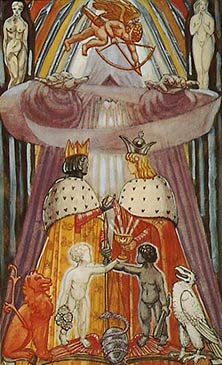
Gemini
Openness to inspiration, intuition, intelligence, second sight, childislmess, frivolity, thoughtfulness divorced from practical consideration, indecision, self-contradition, union in a shallow degree with others, instability, contradiction, triviality, the "high-brow".
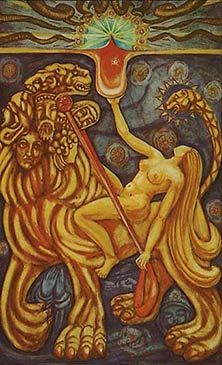
Leo
Courage, strength, energy and action, une grande passion; resort to magick, the use of magical power.
The Psychological Basis
Cards shed light upon the psychological undertones of the current problem.
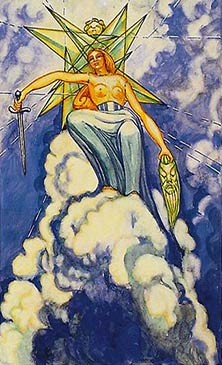
Libra
The Queen of Swords represents the watery part of Air, the elasticity of that element, and its power of transmission. She is enthroned upon the clouds. Her helmet is crested by the head of a child, and from it stream sharp rays of light, illuminating her empire of celestial dew. In her right hand, she bears a sword; in her left hand, the newly severed head of a bearded man. She is the clear, conscious perception of Idea, the Liberator of the Mind.
The person symbolized by this card should be intensely perceptive, a keen observer, a subtle interpreter, an intense individualist, swift and accurate at recording ideas; in action confident, in spirit gracious and just. Her movements will be graceful, and her ability in dancing and balancing exceptional. If ill-dignified, these qualities will all be turned to unworthy purposes. She will be cruel, sly, deceitful and unreliable; in this way, very dangerous, on account of the superficial beauty and attractiveness which distinguish her.
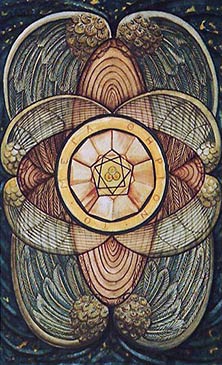
The Root of Earth
The Ace of Disks pictures the entry of that type of Energy which is called Earth. About this whirling Disk are its six Wings; the entire symbol is not only a glyph of Earth as understood in this New Aeon of Horus, but of the number 6, the number of the Sun. This card is thus an affirmation of the identity of Sol and Terra.
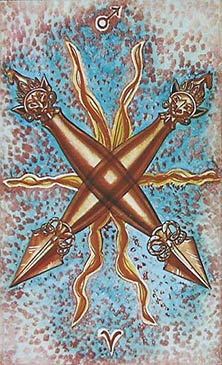
Mars in Aries - Dominion
This card, pertaining to Chokmah in the suit of Fire, represents the Will in its most exalted form. It is an ideal Will, independent of any given object.
"For pure will, unassuaged of purpose, delivered from the lust of result, is every way perfect." AL. 1. 44.
The background of this card shows the power of the planet Mars in his own sign Aries, the first of the Signs. It there represents Energy initiating a Current of Force. The pictorial representation is two Dorjes crossed. The Dorje is the Tibetan symbol of the thunderbolt, the emblem of celestial Power, but more in its destructive than its creative form. More, that is, in its earlier rather than its later form. For destruction may be regarded as the first step in the creative process. The virgin ovum must be broken in order to fertilize it. Fear and repulsion are therefore the primary reaction to the assault. Then, with understanding of the complete plan, willing surrender rejoices to co-operate. Six flames issue from the centre. This indicates the influence of the Sun, who is exalted in Aries. This is the creative Will.
Karma
- These cards represent the influences of karma and destiny that are beyond your control. They suggest adapting to this fate.

Mars in Scorpio - Disappointment
This card is ruled by Geburah in the suit of Water. Geburah being fiery, there is a natural antipathy. Hence arises the idea of disturbance, just when least expected, in a time of ease. The attribution is also to Mars in Scorpio, which is his own house; and Mars is the manifestation on the lowest plane of Geburah, while Scorpio, in its worst aspect, suggests the putrefying power of Water.
Yet the powerful male influences do not show actual decay, only the beginning of destruction; hence, the anticipated pleasure is frustrated. The Lotuses have their petals torn by fiery winds; the sea is arid and stagnant, a dead sea, like a "chott" in North Africa. No water flows into the cups. Moreover, these cups are arranged in the form of an inverted pentagram, symbolizing the triumph of matter over spirit.
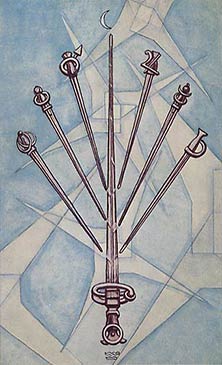
Moon in Aquarius - Futility
Netzach, in the suit of Swords, does not represent such catas trophe as in the other suits, for Netzach, the Sephira of Venus, means victory. There is, therefore, a modifying influence; and this is accentuated by the celestial rule of the Moon in Aquarius.
The intellectual wreckage of the card is thus not so vehement as in the Five. There is vacillation, a wish to compromise, a certain toleration. But, in certain circumstances, the results may be more disastrous than ever. This naturally depends upon the success of the policy. This is always in doubt as long as there exist violent, uncompromising forces which take it as a natural prey. This card, like the Four, suggests the policy of appeasement.
The symbol shows six Swords with their hilts in crescent formation. Their points meet below the centre of the card, imping ing upon a blade of a much larger up-thrusting sword, as if there were a contest between the many feeble and the one strong. He strives in vain.
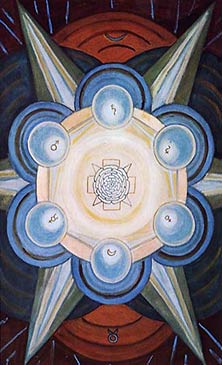
Moon in Taurus - Success
The Number Six, Tiphareth, as before, represents the full harmonious establishment of the Energy of the Element. The Moon in Taurus rules the card; and this, while increasing the approach to perfection (for the Moon is exalted in Taurus and therefore in her highest form) marks that the condition is transient.
The disks are arranged in the form of the Hexagram, which is shown in skeleton. In the centre blushes and glows the light rose- madder of dawn, and without are three concentric circles, golden yellow, salmon-pink, and amber. These colours show Tiphareth fully realized on Earth; it reaffirms in form what was mathematically set forth in describing the Ace. The planets are arranged in accordance with their usual attribution; but they are only shown as disks irradiated by the Sun in their centre. This Sun is idolized as the Rose and Cross; the Rose has forty-nine petals, the interplay of the Seven with the Seven.

